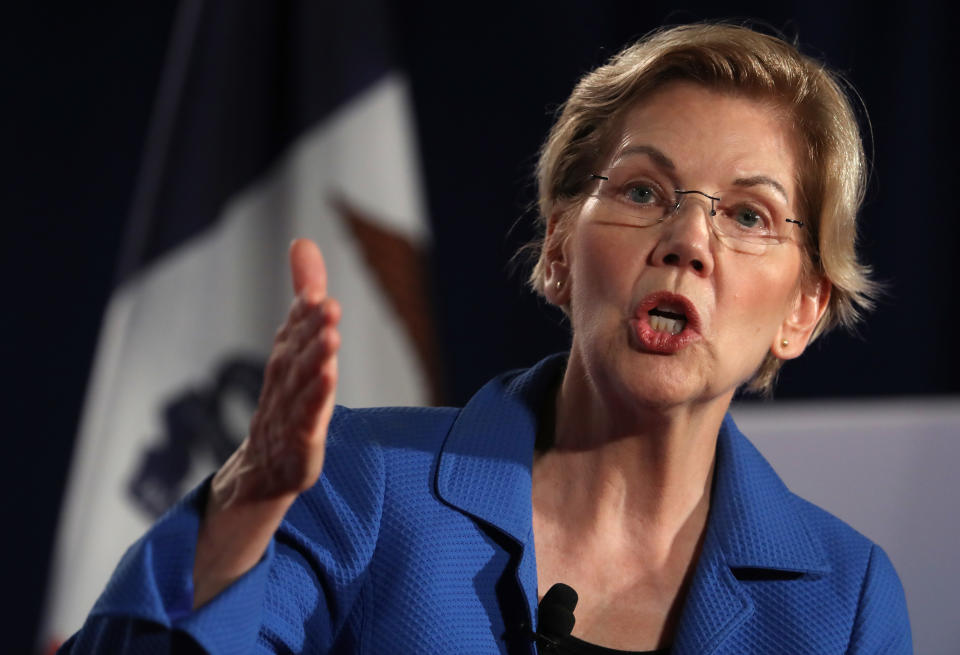Warren warns of a 'coming economic crash'
Several years before the Great Recession began in 2008, a Harvard Law professor predicted that reckless home-mortgage lending could lead to a banking crisis. Now, as a senator and Democratic presidential candidate, Elizabeth Warren again sees “serious warning signs” of a “coming economic crash.”
“I warned about an economic crash years before the 2008 crisis, but the people in power wouldn’t listen,” Warren wrote in a Medium blog post published Monday. “Now I’m seeing serious warning signs again — and I’m calling for action before another crisis costs America’s families their homes, jobs and savings.”
Ahead of the 2008 crisis, which economists say was by some measures worse than the 1929 crash that precipitated the Great Depression, Warren in 2003 said she “rang the alarms” about subprime lenders “tricking unsuspecting families — especially families of color — into refinancing into overpriced subprime mortgages.”
Then in 2004, she “warned that families were getting deeper into debt and hanging on only by borrowing against their homes, which put them in a vulnerable position if costs rose or a family member lost a job.” The median down payment for first-time home buyers was just 3 percent of the purchase price, she noted. She “flagged that foreclosure rates were starting to go up but that the mortgage lenders were still churning out loans.”

“Those trends — shady subprime lending, rising household debt, a mortgage market where lenders didn’t bear the risk of their loans — set the stage for the 2008 crisis” that cost millions of Americans their houses and jobs, Warren said.
Now “the warning lights are flashing” again, the presidential hopeful wrote in her article, titled “The Coming Economic Crash — and How to Stop It,” in which she referenced economic experts who expect another recession will come by the end of 2020. “Whether it’s this year or next year, the odds of another economic downturn are high. This time, though, we can head it off. Congress and regulators should act immediately.”
Warren said high corporate and household debt and a decline in the U.S. manufacturing industry left the nation vulnerable to “serious shocks on the horizon that could cause our economy’s shaky foundation to crumble.”
Household debt has been climbing due to student and auto loans, wage stagnation and rising living costs, Warren said. She recommended her previously announced proposals to raise the minimum wage, offer universal childcare and cancel outstanding student loans while making public colleges tuition-free.
She also proposed tackling corporate debt by monitoring and reducing leveraged lending, which she compared to the surge in subprime mortgages that almost took down the banking system in 2008. Warren called on the Financial Stability Oversight Council, which was established by the Dodd-Frank Act, to monitor risks and announce a plan to address them.
Last, the Democratic candidate criticized President Trump as she addressed the manufacturing recession while brandishing her “Green Manufacturing plan” to invest $2 trillion in green research, manufacturing and exporting over the next decade.
“Our country’s economic foundation is fragile, and a single shock could bring it all down. Trump's reckless behavior makes that shock more likely,” wrote Warren, who dismissed “Trump’s promises of a manufacturing ‘renaissance’” and argued that his trade war with China threatens American manufacturing.
A deadline looms for a budget deal between congressional Democrats and the White House to raise the U.S. debt ceiling, avoiding a government shutdown and a potential U.S. default on its debt, which would devastate financial markets and the global economy. The deal under discussion would put off the problem for two more years — making it an issue for the next presidential term.
Warren criticized that approach and said Congress should “take the prospect of breaching the debt ceiling off the table forever by either eliminating it or by automatically raising the ceiling to accommodate spending and revenue decisions authorized by Congress.”
“With an economy this vulnerable, we need to reduce the odds of the potential shocks that can send us into another downturn,” she wrote.
_____
Download the Yahoo News app to customize your experience.
Read more from Yahoo News:



